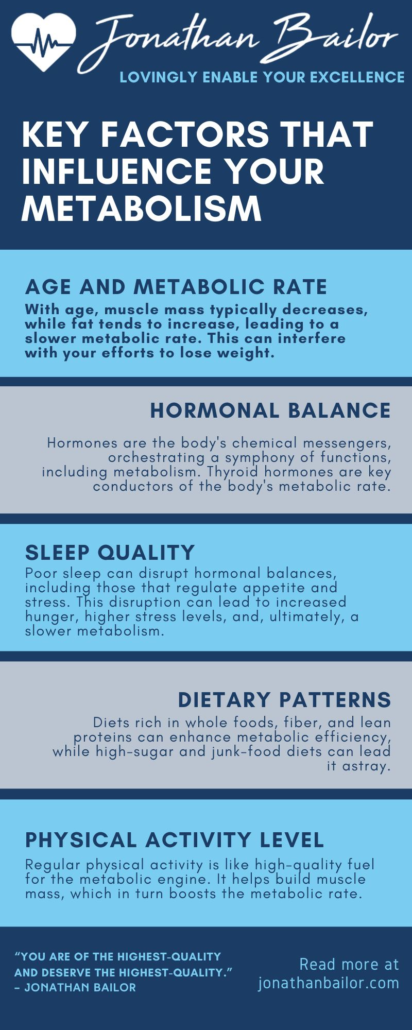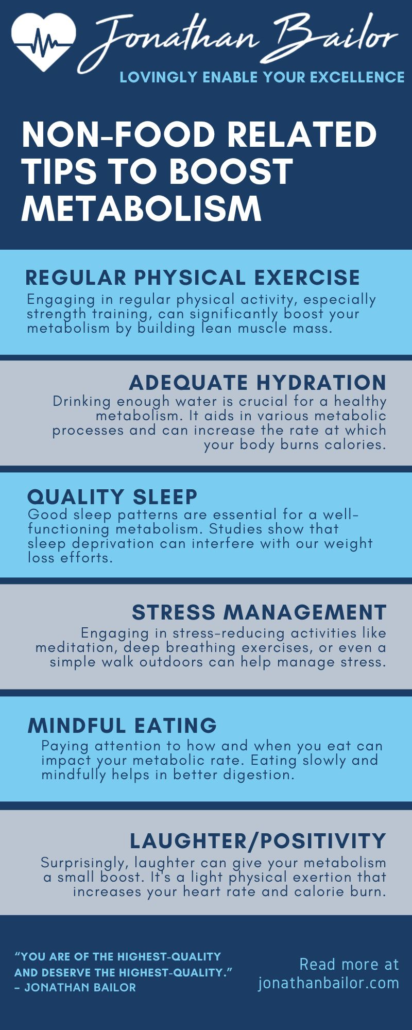9 Metabolic-Boosting Foods to Include in Your Diet
Discover these 9 metabolic-boosting foods to include in your diet right now in this Hormone health guide with aJonathan Bailor! Navigating the world of nutrition can often feel like a maze, with every turn presenting a new “superfood” or a must-try diet trend to lead you to the ideal body weight. However, amidst the noise, there’s one underlying truth that remains constant: whole, nutrient-dense foods have the remarkable ability to naturally enhance our body’s fat metabolism and reduce body fat.
If you enjoy this type of content make sure to check out our Dry January guide and the 26 Lifestyle Tweaks for a Vibrant Endocrine System: Timetable for Change article next!
Embarking on a journey to enhance our metabolic health goes beyond the basics of dieting; it’s about understanding and nurturing our body’s natural setpoint weight. This concept, central to optimizing metabolic health, involves maintaining a balance that our body naturally gravitates towards when supported with the right nutrients and lifestyle choices.
This blog post is dedicated to unveiling 9 such foods—not just as metabolic boosters but as key players in harmonizing with your body’s setpoint. These foods are everyday heroes, accessible and potent in ensuring your metabolism operates at its peak, helping you maintain your natural setpoint weight with ease and efficiency.
The beauty of these metabolic-boosting foods lies in their simplicity and the fact that they can be easily incorporated into your daily meals. Whether it’s whipping up a protein-rich morning omelet, enjoying a mid-afternoon snack that packs a punch, or choosing the right vegetables for your dinner plate, these foods are about making small, manageable changes that have a significant impact on your health.
So, let’s embark on this journey of discovery together. Share this post with your friends and family; it might just be the little nudge they need to make a positive change in their diet. And who knows, these metabolic-boosting foods could be the secret ingredients to a healthier, happier you! Stay tuned for the full list of these amazing foods and tips on how to integrate them into your life with ease.
Key Factors Influencing Your Metabolism
Metabolism, the silent engine within our bodies, works tirelessly, dictating how we utilize energy and maintain our vitality. However, several factors can alter the efficiency of this engine, impacting our overall well-being. Let’s explore some of these influential factors, shedding light on how they play a pivotal role in our metabolic health.
1. Age and Metabolic Rate
As we journey through life, our metabolism subtly shifts gears. With age, muscle mass typically decreases, while fat tends to increase, leading to a slower metabolic rate. This can interfere with your efforts to lose weight. This change is a natural process, but it doesn’t mean surrendering to it. Regular physical activity and strength training can help preserve muscle mass, keeping the metabolic flame burning brightly even as the years add on.
2. Hormonal Balance
Hormones are the body’s chemical messengers, orchestrating a symphony of functions, including metabolism. Thyroid hormones, in particular, are key conductors of metabolic rate. An imbalance, such as in conditions like hypothyroidism, can cause the metabolism to slow down, affecting energy levels and weight management. A balanced diet, regular exercise, and medical management of thyroid issues can help in maintaining a healthy metabolic rhythm.
3. Sleep Quality
Often underrated, sleep plays a crucial role in metabolic health. Poor sleep can disrupt hormonal balances, including those that regulate appetite and stress. This disruption can lead to increased hunger, higher stress levels, and, ultimately, a slower metabolism. Cultivating good sleep habits, like maintaining a regular sleep schedule and creating a restful environment, can help sustain a healthy metabolism.
4. Dietary Patterns
What we eat and how we eat it can significantly influence our metabolic rate. Diets rich in whole foods, fiber, and lean proteins can enhance metabolic efficiency, while high-sugar and junk-food diets can lead it astray. Eating at regular intervals and not skipping meals can also keep the metabolic engine running smoothly, preventing it from slowing down.
5. Physical Activity Level
Regular physical activity is like high-quality fuel for the metabolic engine. It helps build muscle mass, which in turn boosts the metabolic rate. Even simple activities like walking, gardening, or light aerobic exercises can ignite the metabolic rate, leading to more efficient energy use and better health outcomes.
Understanding these factors is like having a roadmap to better metabolic health. By being mindful of these aspects, we can take proactive steps to keep our metabolism humming along, supporting a life full of energy and vitality. Share these insights with those you care about, as understanding and nurturing our metabolism is a key step towards lasting health and well-being.

Feeling Better Is Priceless, That's Why We Don't Put A Price On It!
“It’s Like A Free and Medically Valid Version of Noom and Weight Watchers Online”
~ Dr. Doctor Matthew Oleshiak, MD
Click the 'LEARN MORE' button below for free lifetime access to the fast fix program developed by Jonathan and top Ivy League Medical Doctors
LEARN MOREP.S. It's not a free trial. It's not part of the program for free. The entire program is free, forever, for real! No credit card needed.
11 Metabolism-Boosting Foods for a Healthier You
In the quest for a vibrant and energetic life, what we eat plays a starring role, particularly in how our body manages energy and burns calories. The following 11 foods are not just nourishing choices; they are natural catalysts that can enhance your metabolic rate, supporting your body’s ability to efficiently use energy.
Each food item brings its own unique blend of nutrients, working synergistically with your body’s natural processes. Let’s explore these foods and discover simple, delicious ways to integrate them into your daily diet.
1. Chili Peppers
Capsaicin, the compound that gives chili peppers their heat, increases metabolic rate by inducing thermogenesis, where the body burns calories to produce heat. Add chopped chili peppers to your morning eggs or sprinkle some cayenne pepper onto grilled vegetables for a spicy kick.
2. Lean Protein (Chicken, Turkey, Fish)
Foods high in protein, like chicken and turkey, require more energy for digestion, thus increasing the metabolic rate. Include grilled chicken in your salads or have baked fish for dinner to make your meals both protein-rich and metabolism-friendly.
3. Greek Yogurt
Rich in protein and probiotics, Greek yogurt boosts metabolism by improving your gut health and requiring more energy for digestion. Opt for a Greek yogurt parfait with berries for breakfast or as a healthy snack.
4. Citrus Fruits (Grapefruit, Lemon)
Citrus fruits like grapefruit and lemon are low in sugar and high in vitamin C, which can aid in metabolizing fat. Start your day with a grapefruit or squeeze fresh lemon into your water to stay hydrated and boost your metabolism.
5. Broccoli
This nutrient-dense vegetable is high in fiber, requiring more energy to digest, thus boosting your metabolism. Add steamed broccoli to your dinner plate or toss it in salads for a nutritious crunch.
6. Almonds
Despite being calorie-dense, almonds are rich in healthy fats and protein, making them great for metabolism. A small handful of almonds can be a satisfying snack or can be added to oatmeal or yogurt.
7. Spinach
Packed with iron, necessary for energy production, spinach is a metabolism-boosting powerhouse. It’s also rich in fiber, which helps in regulating blood glucose levels, thereby supporting a steady metabolic rate. Incorporate spinach into smoothies or use it as a base for salads to get a healthy dose of iron and fiber, ensuring your energy levels remain consistent throughout the day.
8. Salmon
The omega-3 fatty acids in salmon help regulate metabolism by balancing blood sugar and reducing inflammation. Enjoy grilled or baked salmon for a hearty meal that supports your metabolic health.
9. Berries (Strawberries, Blueberries)
Berries are low in sugar and high in antioxidants, aiding in metabolism and providing essential nutrients. Mix them into your morning yogurt or enjoy them as a light, refreshing snack.
Incorporating these foods into your daily diet is a natural and delicious way to support and enhance your body’s metabolism. Each item not only contributes to a better metabolic rate but also adds variety and flavor to your meals, making healthy eating both enjoyable and beneficial.

Enhancing Metabolism Beyond Diet: Holistic Approaches for a Vibrant Life
The journey to a healthier metabolism and setpoint extends beyond the realm of diet. It’s a holistic balance of physical, mental, spiritual, and behavioral practices that can significantly impact how our bodies process and utilize energy. Embracing these practices can lead to a more efficient metabolism, contributing to overall well-being and vitality. Here are some effective, non-dietary ways to boost your metabolism, seamlessly woven into your daily routine to complement your healthy lifestyle.
1. Regular Physical Exercise
Engaging in regular physical activity, especially strength training, can significantly boost your metabolism by building lean muscle mass. It also increases your energy expenditure. Even 20 minutes of strength training a couple of times a week can make a noticeable difference.
Incorporate simple exercises like squats, push-ups, or yoga poses into your morning routine to kickstart your day.
2. Adequate Hydration
Drinking enough water is crucial for a healthy metabolism. It aids in various metabolic processes and can increase the rate at which your body burns calories.
Try starting your day with a glass of water and keeping a bottle handy throughout the day to ensure you stay well-hydrated.
3. Quality Sleep
Good sleep patterns are essential for a well-functioning metabolism. Studies show that sleep deprivation can interfere with our weight loss efforts.
Aim for 7-8 hours of quality sleep each night. Establish a calming bedtime routine, such as reading or meditating, to improve your sleep quality and support your metabolic health.
4. Stress Management
High stress levels can adversely affect your metabolism. Engaging in stress-reducing activities like meditation, deep breathing exercises, or even a simple walk outdoors can help manage stress.
Allocating a few minutes each day to these practices can keep your stress levels in check and your metabolism humming.
5. Mindful Eating
Paying attention to how and when you eat can impact your metabolic rate. Eating slowly and mindfully helps in better digestion and nutrient absorption. Try to create a calm eating environment, free from distractions like television or smartphones, to practice mindful eating.
6. Laughter and Positivity
Surprisingly, laughter can give your metabolism a small boost. It’s a light physical exertion that increases your heart rate and calorie burn. Incorporate laughter into your day by watching a funny show or spending time with friends who bring joy.
By incorporating these practices into your daily life, you can enhance your metabolic efficiency in a holistic and enjoyable way. Remember, boosting your metabolism is not just about what you eat; it’s about nurturing your body and mind in harmony.

Metabolic Health FAQ: Understanding and Enhancing Your Metabolism
In the pursuit of optimal health and vitality, understanding our metabolism is key. This FAQ aims to shed light on some of the most common questions surrounding metabolic health, offering insights into how we can nurture and improve it. Let’s explore these questions to gain a clearer understanding of metabolic health and how it impacts our overall well-being.
Q1: What exactly is metabolism, and why is it important?
Metabolism refers to the chemical processes in our body that convert food into energy. This energy is essential for everything, from breathing to moving to thinking. A healthy metabolism efficiently converts these nutrients into energy, keeping our body functioning optimally. When our metabolism is in good shape, we feel more energetic, our body manages weight more effectively, and our overall health is improved.
Q2: Can your metabolic rate change over time?
Yes, your metabolic rate can change due to various factors. As we age, our metabolic rate tends to slow down due to a decrease in muscle mass and hormonal changes. However, this isn’t a fixed process. Engaging in regular physical activity, especially strength training, can counteract this decline by building muscle, which burns more calories than fat, thus boosting the metabolism.
Q3: How does sleep affect metabolic health?
Quality sleep is crucial for maintaining a healthy metabolism. Lack of sleep can disrupt the balance of key hormones, including those that regulate appetite and stress. This imbalance can lead to increased hunger and cravings for unhealthy food, slowing down the metabolic rate. Ensuring adequate and quality sleep supports hormonal balance and, consequently, a healthy metabolism.
Q4: Are there specific foods that can boost metabolism?
Certain foods can indeed boost your metabolism. These include protein-rich foods like lean meats and legumes, which require more energy to digest, and spicy foods containing capsaicin, like chili peppers, which can induce a thermogenic effect. Additionally, green tea and coffee can mildly increase metabolic rates due to their caffeine content.
Q5: Does stress have an impact on metabolism?
High levels of stress can negatively impact your metabolism. Stress triggers the release of the hormone cortisol, which can lead to cravings for high-fat, high-sugar foods, often leading to weight gain. Managing stress through techniques like meditation, deep breathing, or regular exercise can help maintain a healthy metabolism.
Understanding metabolic health is about more than just managing weight; it’s about creating a lifestyle that supports your body’s natural processes and overall well-being. By paying attention to these aspects, you can take proactive steps to maintain a healthy and efficient metabolism.
Embracing Metabolic Health: A Journey to Share
As we conclude our exploration of metabolic health, remember that the journey to wellness is both personal and universal. The steps we’ve discussed – from nourishing foods to holistic lifestyle changes – are more than individual choices; they’re pathways to a vibrant life we can all aspire to.
Let’s not keep this wisdom to ourselves. Share this treasure trove of knowledge with friends and family across all social media platforms and through email. By spreading this message, we can collectively strive towards enhanced health and vitality, making a positive impact on our communities. Let’s embark on this journey together, sharing and thriving.
Feeling Better Is Priceless, That's Why We Don't Put A Price On It!
“It’s Like A Free and Medically Valid Version of Noom and Weight Watchers Online”
~ Dr. Doctor Matthew Oleshiak, MD
Click the 'LEARN MORE' button below for free lifetime access to the fast fix program developed by Jonathan and top Ivy League Medical Doctors
LEARN MOREP.S. It's not a free trial. It's not part of the program for free. The entire program is free, forever, for real! No credit card needed.




